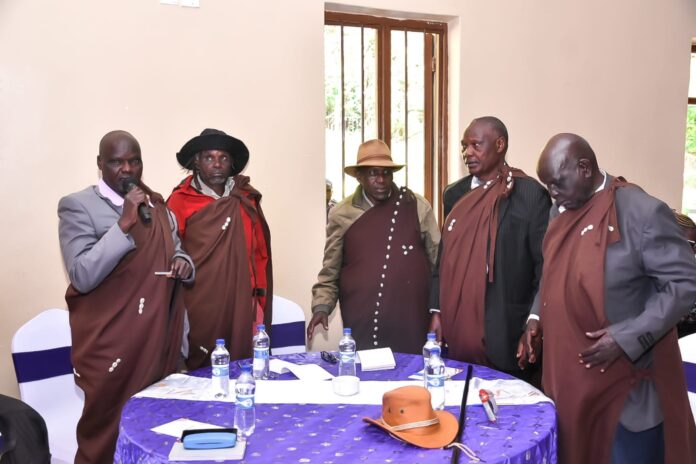By Tony Wafula, Bungoma
Bungoma County has made significant strides in combating Gender-Based Violence (GBV) through a strategic partnership with the Finnish government.
The initiative has driven major policy reforms, raised public awareness on gender based violence and female genital mutilation and enhanced response mechanisms across the region.
Speaking at the program’s close-out conference on Thursday, Dr. Josphine Obwonyo, Secretary for Gender at the State Department of Gender and Affirmative Action, highlighted the project’s historic achievements in addressing Female Genital Mutilation (FGM) and gender based violence (GBV) cases, particularly in Mt. Elgon.
She noted that strict measures have been implemented to put an end to gender-based violence.
“We have been able to train counseling psychologists, mediators among other stakeholders and the feedback has been positive so far,” she added.
Further, Dr. Obwonyo also assured the public that the campaign to eliminate GBV in the region would continue, regardless of the Kenya-Finland partnership.
“As this program was ongoing, we had counter funding from the government through the State Department for Gender and Affirmative Action, and we are currently in talks with the exchequer to ensure its continuation,” she stated.
Dr. Obwonyo also mentioned a notable reduction in GBV cases compared to the 2022 Kenya Demographic and Health Survey (KDHS), where Bungoma County ranked fourth in terms of GBV cases.
According to the UNICEF report it is estimated that at least 200 million girls and women alive today have been subjected to Female Genital Mutilation in 30 countries in Africa, the Middle East and Asia.
It further stated that, In Kenya, about 9.3 million girls and women have undergone FGM.
According to the Kenya Demographic and Health Survey (KDHS) 2022, it indicated that Bungoma has recorded 19 percent cases of teenage pregnancy being number 37.
The KDHS report also highlights that 34% of women in Kenya have encountered physical violence since age fifteen, compared to 27% of men.
The Kenya Demographic and Health Survey (KDHS) stated that the national prevalence of FGM among women and girls aged 15-49 years has gradually declined from 38% in 1998, 32% in 2003, 27% in 2008-2009, 21% 2014 and 15% in 2022.
Annu Rantala, Head of Cooperation at the Embassy of Finland, emphasized that the program aimed to strengthen existing structures and workforce to prevent and respond to GBV.
“I am happy to see that GBV cases are now being reported, instead of victims suffering in silence. Our aim is to see a reduction in these cases, but it is a positive sign that they are being raised so survivors can receive justice and support,” she said.
The program was implemented in three counties: Bungoma, Kilifi, and Samburu with a funding of Ksh700 million.
Bungoma County Deputy Governor Jenipher Mbatiany praised the initiative’s impact, particularly noting the historic public renunciation of Female Genital Mutilation (FGM) by the Sabaot community, led by the Supreme Council of Elders.
“This achievement underscores the power of community-driven efforts in dismantling harmful cultural practices,” Mbatiany remarked.
The program introduced data-driven interventions to improve GBV response, strengthen law enforcement, and enhance coordination among key stakeholders. A key feature of the initiative was the involvement of men, especially Sabaot and Bukusu elders, in reshaping societal attitudes and promoting gender equality.
Mbatiany also emphasized that Bungoma is now better positioned to prevent and respond to GBV, thanks to structured risk assessments and targeted resource allocation.
“With a well-defined vulnerability calendar, we can implement timely and effective interventions where they are needed most,” she stated.
Partnerships with local NGOs, law enforcement and community-based organizations have enhanced survivor support services, while mentorship programs have fostered long-term behavioral change.
The Principle-Based Leadership (PBL) model, a cornerstone of the initiative, played a crucial role in mobilizing collective action against GBV.
As the program officially concludes, Mbatiany reaffirmed the county administration’s commitment to sustaining these gains, calling for continued action from individuals, institutions, and governments to eliminate GBV once and for all.




